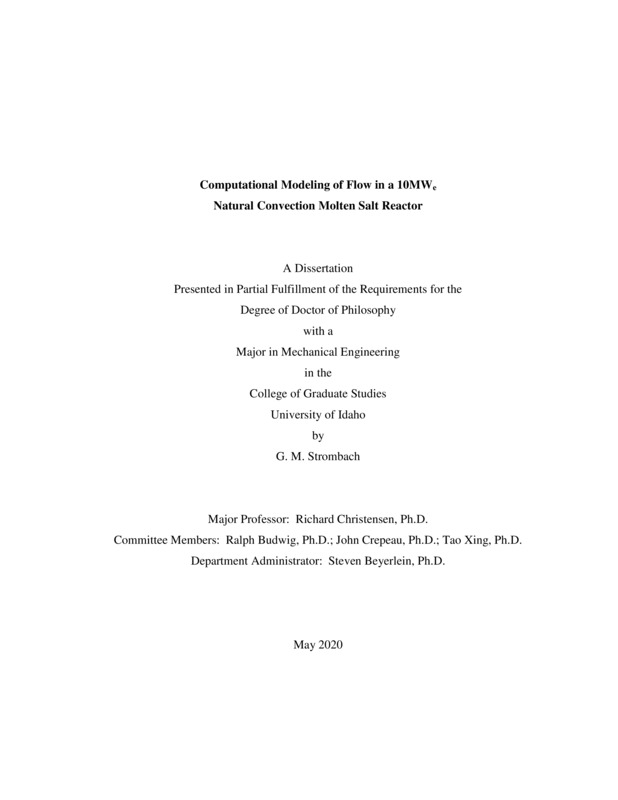Computational Modeling of Flow in a 10MWe Natural Convection Molten Salt Reactor
Strombach, Gail Michael. (2020-05). Computational Modeling of Flow in a 10MWe Natural Convection Molten Salt Reactor. Theses and Dissertations Collection, University of Idaho Library Digital Collections. https://www.lib.uidaho.edu/digital/etd/items/strombach_idaho_0089e_11452.html
- Title:
- Computational Modeling of Flow in a 10MWe Natural Convection Molten Salt Reactor
- Author:
- Strombach, Gail Michael
- Date:
- 2020-05
- Embargo Remove Date:
- 2021-08-26
- Keywords:
- CFD Convection Molten Natural Reactor Salt
- Program:
- Mechanical Engineering
- Subject Category:
- Energy; Engineering; Nuclear engineering
- Abstract:
-
This research investigates the use of computational fluid dynamics (CFD) to simulate flow in a practical power system that includes a natural-convection molten salt reactor (MSR). Included herein are five sets of simulations, which start simply and build in complexity.
Unique aspects of this research:
• Each simulation explores realistic design aspects of practical MSRs; i.e., those used for electric power generation, etc.
• Each simulation uses internal heat generation (instead of surface/external heat flux) to reflect energy released in the reactor vessel.
• An actual fuel salt was used for three of the five simulation sets. It is based on a mixture of lithium & beryllium fluoride salt, known as FLiBe.
• Simulations that use FLiBe as the working fluid include a newly developed relation – variable energy source/power density – for energy released in the reactor vessel. This unique approach is based on operational data from actual MSRs. It reflects changes in reactivity (and thus power density) as a function of salt temperature and thus captures the negative temperature coefficient effect.
First is a series of 16 cases, using simple cylinders for the reactor and heat exchanger, with water as the working fluid. These determine the size, shape & elevation difference between the reactor vessel and heat exchanger. To achieve natural convection flow within a specified temperature range, the minimum relative elevation difference between the reactor and heat exchanger is 12 feet. CFD results in the range of interest match analytic values within 4.4%.
Next is a series of 10 cases, using baffled cylinders for the reactor and heat exchanger, with FLiBe salt as the working fluid. These determine the elevation difference between the reactor vessel & heat exchanger. To achieve natural convection flow within a specified temperature range, the minimum relative elevation difference between the reactor and heat exchanger is also 12 feet. CFD results in the range of interest match analytic values within 0.55%.
The third set is a benchmarking template for a test rig built at the University of Idaho campus in Idaho Falls. At the point of incipient natural convection flow, the temperature difference from the simulation is within 2.45% of the value predicted by analytic means.
Next is simulation of a realistic MSR system. It includes a reactor vessel with complex internal structure, to model an array of graphite moderator bars. This confirms that a relative difference in elevation of 12 feet meets the design criteria for the specified temperature range.
Finally, a simulation of a different realistic MSR system which uses an external reflector rather than internal moderator bars. The original design has a difference in elevation of 4 feet. Simulations show that this does not meet the design criteria of achieving the recommended temperature range.
These results suggest that it is possible to simulate a realistic natural convection molten salt reactor. Using the techniques herein, one can obtain valuable engineering information to assist in the design of practical power systems.
- Description:
- doctoral, Ph.D., Mechanical Engineering -- University of Idaho - College of Graduate Studies, 2020-05
- Major Professor:
- Christensen, Richard
- Committee:
- Budwig, Ralph; Crepeau, John; Xing, Tau
- Defense Date:
- 2020-05
- Identifier:
- Strombach_idaho_0089E_11452
- Type:
- Text
- Format Original:
- Format:
- application/pdf
- Rights:
- In Copyright - Educational Use Permitted. For more information, please contact University of Idaho Library Special Collections and Archives Department at libspec@uidaho.edu.
- Standardized Rights:
- http://rightsstatements.org/vocab/InC-EDU/1.0/

